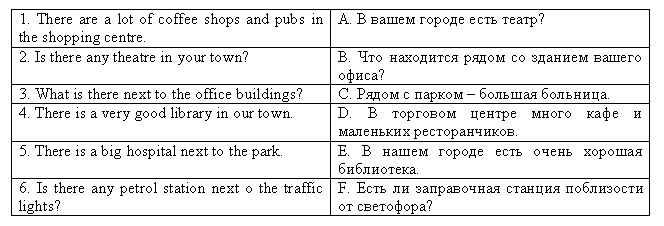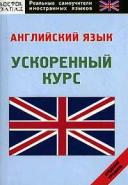Книга: Английский язык: самоучитель
FOCUS ON GRAMMAR Активная грамматика
Разделы на этой странице:
FOCUS ON GRAMMAR
Активная грамматика
Language focus 1
Questions with there is/there are (more practice)
Вопросительныепредложения. Структураthere is/there are (дополнительнаяпрактика)
1. Match the sentences and their translations.
Подберите соответствующий перевод.

2. Complete the sentences.
Дополните предложения.
What is there…………………………………………………………………?
Is there………………………………………………………………………………?
There are some good…………………………………………………?
There aren’t any…………………………………………………………?
Is there any shop………………………………………………………?
What is there next to……………………………………………?
Are there……………………………………………………………………………?
There is a…………………………………………………………………………?
3. Put these sentences into the Past.
Скажите эти фразы в прошедшем времени.
Example: There is a museum next to the park.
There was a museum next to the park.
1. Is there a cafe next to the cinema?
2. Are there good restaurants in the town centre?
3. There isn't any accommodation for tourists here.
4. What is there next to the traffic lights?
5. There are shops round the corner.
6. Are very any swimming pools in your town?
7. There are signs there.
8. Who is there next to your friend?
9. There is nobody at the tourist information office.
Language focus 2
The Future Simple (Indefinite) Tense
Будущее простое (неопределенное) время
Будущее простое время употребляется с такими наречиями времени, как
tomorrow – завтра,
tomorrow morning – завтра утром,
next week – на следующей неделе,
next year – в следующе мгоду,
next month – в следующем месяце,
in a month – через месяц,
the day after tomorrow – послезавтра,
tonight – сегодня вечером и т. д.
Будущее простое время образуется с помощью вспомогательного глагола will или shall плюс начальная форма глагола. Shall употребляется для первого лица единственного числа (I), а will – для всех остальных лиц и чисел. Однако форма shall считается несколько устаревшей, поэтому чаще всего вместо нее используется will. Сокращенная форма– 'll.
I shall/will show you the way.
He will take me to the zoo tomorrow.
She will buy a leaflet for you.
They will build a new railway bridge next year.
He’ll stay here tomorrow.
Вопросительные и отрицательные предложения:
Shall/Will I turn left at the crossroads?
I shan’t (shall not)/won’t (will not) forget about it.
We won’t go over this plan tomorrow.
Will she meet you at the international conference?
We won’t confirm your plan.
When will you discuss the possible problems?
Who will come to you tomorrow?
She won’t be there next weekend.
4. Put the sentences into the Future Simple Tense.
Составьте предложения в простом будущем времени.
My friend calls me every evening.
Do they work out a new plan every day?
Where does he always buy these souvenirs?
I don't go past the traffic lights.
Who follows them every weekend?
She doesn't work at the business estate.
Probably, she is an officer.
I look for new accommodation in the city centre.
This shopping centre is very attractive for tourists.
Those exercises are very easy for me.
5. Ask Questions. Give negative answers.
Задайте вопросы. Дайте отрицательные ответы.

6. Make up your own sentences with adverbs of time and the verbs given.
Составьте предложения с наречиями времени и данными глаголами.
Например: yesterday, to show
Yesterday she showed me the way to the market.
tomorrow, to serve
next year, to visit
now, to build
three days ago, to use
last month, to tell
tonight, to study
every day, to order
in 1997, to develop
tomorrow morning, to give
7. Translate into English.
Переведите на английский язык.
1. Наша встреча не будет эффективной без него.
2. Где вы будете обсуждать эти вопросы?
3. Кто изучит в деталях эти планы на следующей неделе?
4. Они не принесут наш заказ в следующую пятницу.
5. Жизнь будет более приятной в следующем веке.
6. Это будет самая энергичная вечеринка в моей жизни.
7. Мы снова получим ваше сообщение в следующую субботу.




